RPA Interview Questions And Answers
4.9 out of 5 based on 8529 votesLast updated on 1st Jul 2024 19.36K Views
- Bookmark

Prepare for RPA interviews with key questions on automation tools, processes, benefits, challenges, and practical implementation scenarios.

Robotic Process Automation (RPA) revolutionizes business operations by automating repetitive, rule-based tasks, enabling organizations to improve efficiency and accuracy. It utilizes software robots to emulate human interactions with digital systems, enhancing productivity and freeing employees for strategic work.
Whether you're a fresher, developer, or experienced professional, RPA Online Training helps you understand RPA's principles, tools, and best practices, which is essential for successfully implementing and optimizing automation solutions in today's dynamic business environment.
General RPA Interview Questions And Answers
Here are some general RPA interview questions and answers:
- What is RPA?
RPA is a technology that allows the creation of software robots or "bots" to automate repetitive and rule-based tasks typically performed by humans. These bots can interact with digital systems and software, mimicking human actions.
- What are the benefits of RPA?
RPA offers several benefits, including increased efficiency, reduced errors, cost savings, improved compliance, and the ability to scale operations quickly. It frees up human workers to focus on more strategic tasks.
- What are the key components of RPA? (Important Interview questions for RPA)
The key components of RPA include bots (software robots), a control center for managing bots, development tools for designing automation workflows, and analytics tools for monitoring and optimizing bot performance.
- How do you identify processes suitable for RPA?
Suitable processes for RPA are typically repetitive, rule-based, involve structured data, have high transaction volumes, and require minimal human judgment. Processes should also be stable and well-documented.
- What is the difference between attended and unattended RPA?
Attended RPA bots work alongside humans and are triggered by user actions, while unattended RPA bots operate independently, executing tasks without human intervention based on predefined schedules or triggers.
- What is a bot in RPA?
A bot in RPA is a software application designed to automate repetitive tasks. Bots can interact with various applications, manipulate data, trigger responses, and communicate with other systems, mimicking human actions.
- Can RPA be integrated with other technologies?
Yes, RPA can be integrated with other technologies like artificial intelligence (AI), machine learning (ML), natural language processing (NLP), and optical character recognition (OCR) to enhance automation capabilities and handle more complex tasks.
- What are some common RPA tools?
Common RPA tools include UiPath, Automation Anywhere, Blue Prism, WorkFusion, and Pega. These tools provide platforms for designing, deploying, and managing RPA bots.
- What challenges might you face when implementing RPA?
Challenges in RPA implementation include process selection, change management, scaling automation, maintaining bots, and ensuring security and compliance. Additionally, addressing the fear of job displacement among employees can be challenging.
- How do you measure the success of an RPA implementation?
Success can be measured by evaluating key performance indicators (KPIs) such as process efficiency, error reduction, cost savings, time savings, and employee satisfaction. Monitoring these metrics helps assess the impact of RPA on business operations.
RPA Interview Questions And Answers For Developers
Here are some important RPA developer interview questions:
- What programming languages are commonly used in RPA development?
Common programming languages used in RPA development include Python, Java, C#, and VB.NET. These languages are often used for scripting, creating custom components, and integrating RPA tools with other systems.
- How do you handle exceptions in RPA workflows?
Exceptions in RPA workflows are handled using try-catch blocks, error handling activities, and recovery sequences. Proper logging and alert mechanisms are also implemented to identify and address issues promptly.
- What is the role of selectors in UiPath?
Selectors in UiPath are used to identify UI elements on the screen. They define the attributes of elements that bots interact with, ensuring accurate and reliable automation by specifying elements' properties.
- How do you optimize RPA bot performance? (Important RPA developer interview questions)
Bot performance is optimized by streamlining workflows, minimizing unnecessary steps, ensuring efficient use of system resources, and implementing best practices for coding. Regular monitoring and maintenance are also crucial.
- What is the importance of version control in RPA development?
Version control is important in RPA development as it helps manage changes to automation scripts, ensures collaboration among team members, and maintains a history of modifications. It aids in tracking and reverting to previous versions if needed.
These were some of the commonly asked Interview questions for RPA Developers.
You May Also Read These Posts:
Business Implications Of Robotics Process Automation
RPA Interview Questions And Answers For Freshers
Here are some important RPA interview questions for freshers:
- What is RPA, and why is it important?
RPA stands for Robotic Process Automation. It is important because it automates repetitive, rule-based tasks, improving efficiency, reducing errors, and freeing up human workers to focus on more strategic activities.
- What are some common tasks that can be automated using RPA?
Common tasks include data entry, invoice processing, customer service queries, report generation, and data migration. These tasks are repetitive, time-consuming, and rule-based, making them ideal for RPA.
- Can you explain the difference between RPA and traditional automation?
Traditional automation often requires significant changes to the underlying systems and extensive coding. In contrast, RPA uses bots to interact with existing systems at the user interface level, requiring minimal changes to the current infrastructure.
- What are the basic steps to implement an RPA solution?
The basic steps include identifying suitable processes, designing the automation workflow, developing and testing the bots, deploying the bots, and monitoring and maintaining them for optimal performance.
- What is a workflow in the context of RPA?
A workflow in RPA is a sequence of automated steps or tasks performed by bots to complete a specific process. It defines the logical flow of actions and decisions needed to achieve the desired outcome.
Above were the commonly asked RPA interview questions for freshers.
RPA Interview Questions And Answers For Experienced
Here are some RPA interview questions for experienced professionals:
- How do you ensure the scalability of RPA solutions?
Scalability is ensured by designing modular and reusable components, implementing robust exception handling, using centralized management tools, and regularly reviewing and optimizing workflows. Ensuring infrastructure can handle increased bot workloads is also key.
- What are some best practices for maintaining RPA bots?
Best practices include regular bot performance monitoring, updating bots to align with system changes, implementing version control, maintaining detailed documentation, and conducting periodic reviews and optimizations to enhance efficiency.
- How do you handle unstructured data in RPA processes? (Important Robotic Process Automation interview questions)
Handling unstructured data often involves using OCR (Optical Character Recognition) to convert images and PDFs into structured formats, NLP (Natural Language Processing) to interpret text, and integrating AI/ML models to extract and process relevant information.
- Can you describe a challenging RPA project you worked on and how you overcame the challenges?
In a complex invoice processing project, the challenge was handling various formats and exceptions. We overcame this by implementing machine learning models to standardize data extraction and creating a robust exception management framework.
- How do you integrate RPA with existing IT infrastructure? (Important Interview questions for RPA)
Integration involves using APIs, connectors, and middleware to ensure smooth communication between RPA tools and existing systems. It also requires thorough testing, ensuring data security, and compliance with IT policies and standards.
These were the most important RPA interview questions for experienced.
Conclusion
In summary, RPA offers significant benefits by automating repetitive tasks, enhancing efficiency, and reducing errors. Consider checking the RPA interview questions to expand your knowledge. For developers and experienced professionals, understanding best practices, scalability, and integration is crucial. Freshers should invest in RPA Training in Noida to focus on grasping fundamental concepts and identifying suitable processes for automation to leverage RPA effectively in any organization.
Subscribe For Free Demo
Free Demo for Corporate & Online Trainings.
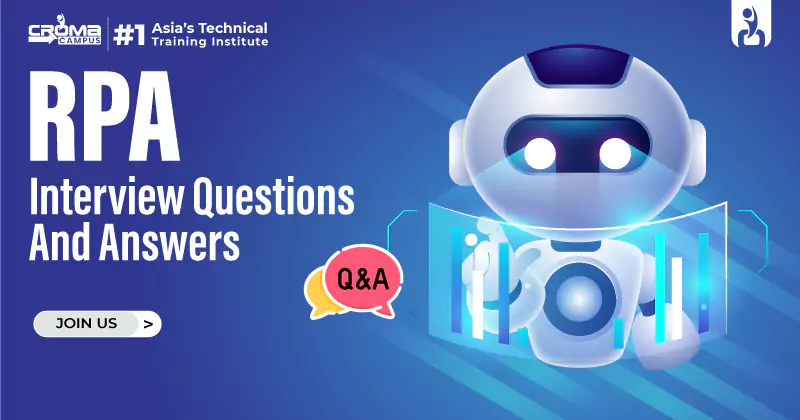


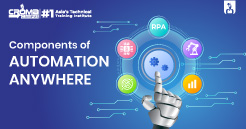

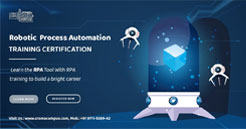
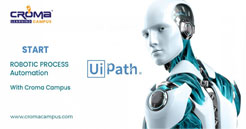
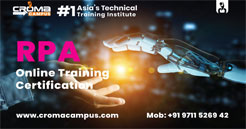

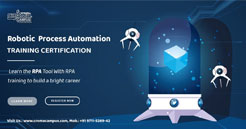















.webp)

.png)















